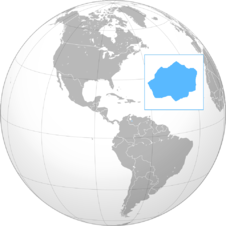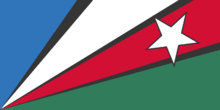Democratic People's Republic of Czea
This article contains information pertaining to a fictional micronation, micronationalist or other fictional element of micronational society or culture. |
Democratic People's Republic of Czea | |||||||||
|---|---|---|---|---|---|---|---|---|---|
 Western Venezuela | |||||||||
| Capital | Bal | ||||||||
| Official languages | Spanish | ||||||||
| Demonym(s) | Czean | ||||||||
| Government | Unitary semi-presidential socialist state | ||||||||
| Legislature | Supreme Council | ||||||||
| Establishment | 24 March 2012 | ||||||||
| Currency | Bolívar | ||||||||
| Time zone | VST (UTC-4:30) | ||||||||
| |||||||||
Czea, officially the Democratic People's Republic of Czea was a Valtir Sector micronation. It was a semi-presidential and unitary socialist republic, consisting of five districts and a capital territory, Bal. Much of the micronation's existence revolved around fictional and fantastic elements.
History

Czea has its origins in March 2011; the word itself was a corruption of Cizland. This origin was created by an anonymous Cizlandeese citizen, and was adopted by the Tsardom of Czea. To hide Czea's bonds with Cizland and its successor the Holy Dussesh Empire, it was said to be created by a Czean prince. Czea can be pronounced as Sheh-Ah or Cheh-Ah.
Czea was founded during the Koss-Montriac crisis, when the Archduchy of Montriac declared independence unilaterally from the Kossian Empire forming the "illegal" Republic of Montriac. The situation was roughly treated, and not many options were presented from any of the two fatuous sides. The Free People's State declared independence when, finally, the Montrésque president Isadora Annenak agreed the conditions stipulated by the Kossian Emperor Lucas Campos in the Montriac letter, creating another state in the sector and sealing the "crisis".
Government
The constitution described the Socialist Unity Party as the "leading force of society and of the state". The Leader of the Socialist Unity Party is supposedly, concurrently Supreme Commissar of the People's Power (President of Czea), but this was repeatedly ignored. The President of Czea, who is also elected by the Supreme Council, served for five years and there was no limit to the number of terms of office.
The Supreme Court of Czea served as the nation's highest judicial branch of government. It is also the court of last resort for all appeals against the decisions of provincial courts.

